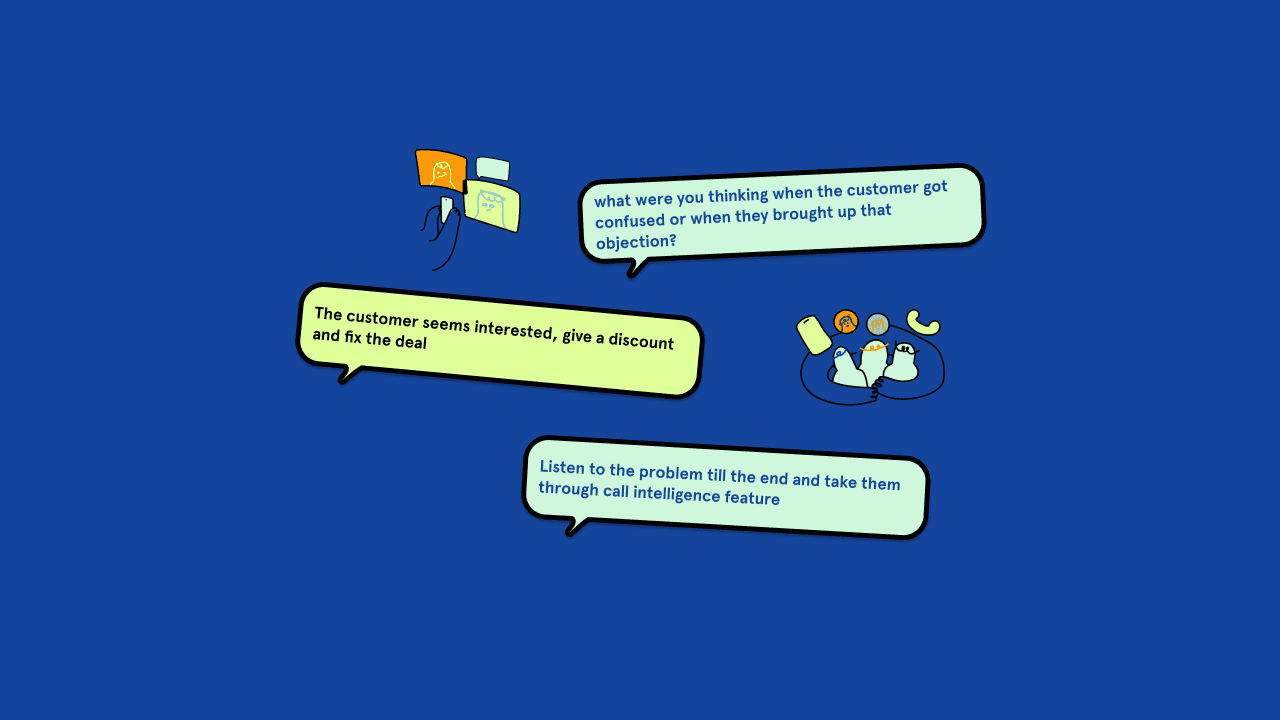Building a strong team of sales reps isn’t just a matter of hiring the right people. While that’s a part of the puzzle, the other part includes effective sales coaching.
Even the best sales reps need consistent (and personalized) coaching to perform better and become a leader.
So, if you haven’t already, you need to invest resources in sales coaching to accelerate your team’s collective success.
In this blog, we’ll cover every aspect of sales coaching, including the best practices and the tech stack you need to coach your reps.
What is Sales Coaching?
Sales coaching is the process through which sales managers attempt to improve overall sales performance. It is a continuous exercise where managers help reps achieve their objectives.
A sales coach can play the role of an advisor, teacher, mentor, and trainer whose purpose is to equip agents with the right support and resources for a consistently strong and efficient sales performance.
To understand this better, let’s simultaneously look at sports coaching with sales coaching.
A sports coach trains and mentors sportspersons to win every game. During a match, they watch their students from the bleachers or benches and motivate them through the game.
Off the field, the coach will share their observations and ensure to share feedback so that they can improve and deliver a better performance the next time.
There’s a lot that sales coaching can draw from sports coaching. For starters, you need a clear sales coaching strategy that is rooted in performance assessment, feedback, and mentoring.
Before we jump into the tools and techniques of sales coaching, let’s try and understand how to improve sales coaching and some of its key benefits.
Reach The Full Potential Of Your Agents with Call Insights
How to Improve Sales Coaching for Your Business?
Improving the performance of your organization’s sales reps involves several steps. This is a process that yields results over time.
The steps involved include:
- Gather all the necessary resources to get a complete overview of each sales rep’s performance.
- Evaluate the system and its needs to create the right KPIs to monitor every rep’s performance.
- Provide managers with the right resources so they can better understand what each rep needs help with and coach them to ensure better results.
With these foundational steps taken care of, managers can:
- Compare and evaluate each rep’s performance amongst their peers
- Track whether or not they’re reaching their goals
- Evaluate their performance over time
- Provide feedback whenever necessary
This is among the best methods to provide coaching for sales performance improvements.
Benefits of Sales Coaching
Sales coaching is not an exercise in vain that sales teams need to do. It comes with real benefits that contribute to the overall sales revenue.
Data-driven sales coaching, in particular, is the way forward. Some of its benefits are listed below.
1. Boosts Sales Productivity
Sales coaching provides a space for managers and leaders to point out gaps in an agent’s performance and deliver constructive feedback.
As a result, agents get the opportunity to build best practices and techniques that eventually contribute to sales success.
2. Builds a Motivated Sales Team
Motivation is key to building a sales team that’s ready to take up challenges and better themselves.
Sales coaching through personalized mentoring sessions, peer-to-peer learning, feedback, etc., are meant to help sales agents in developing their skills.
Personalized sales coaching can also help provide sales reps with actionable feedback to help improve their performance.
3. Improves Win Rate
We recommend investing in sales coaching as it also helps improve the sales win rate. With the right tools and techniques, agents are equipped to widen the scope of successfully closing deals.
4. Minimizes Agent Turnover
Data-driven sales management can help reduce agent turnover. In the absence of sales coaching and an efficient sales coach, agents are likely to be demotivated by objections, thereby contributing to an increased turnover.
However, with the right guidance and access to the right tools and techniques, agents can be better equipped to handle different situations.
Sales coaching thus ensures an environment where agents are motivated and strive to improve their performance.
5. Serves as an Incentive to Boost Motivation
As mentioned earlier, effective data-driven sales coaching can lead to employees performing better, further raising their chances of receiving incentives for a job well done.
This, in turn, can lead to increased motivation and friendly competition, thereby ensuring that sales reps perform at their best at all times.
6. Helps Sales Managers Improve With Time
While it’s essential that sales reps are trained effectively, sales managers also need to improve their skills and coaching techniques with time.
A consistent sales coaching framework can also help sales managers learn more, improve their coaching skills, and provide them with the skill they need to teach different sales reps with different learning curves and methods.
What is a Data-Driven Sales Approach, and How Does It Work?
Data-driven sales coaching measures each sales rep’s output, so sales managers can quickly diagnose areas of improvement and train sales reps accordingly.
This method has several benefits when compared to old-school sales coaching techniques. It works as follows:
1. Helps Evaluate Sales Performance Amongst Peers
To start, a data-driven approach to sales performance coaching can help managers evaluate and compare sales reps’ performance amongst their peers to ensure effective performance management.
With the KPIs for each process drawn out, managers can evaluate and compare sales reps on all levels of the sales funnel, i.e., the top, middle, and bottom.
2. Helps Managers Track Achievements Against Set Goals
Once an effective framework for a data-driven sales approach is created, managers can set goals for each sales rep in terms of the number of calls or emails made or sent, opportunities and pipelines generated, and more.
Setting targets for each rep helps them meet their sales quota, regardless of what it may be. This eventually benefits the organization as a whole while also ensuring employees are motivated to improve and meet their targets.
3. Helps Track Sales Reps’ Performance Over Time
Apart from creating a framework to provide each sales rep with a set of goals to meet, a data-driven approach with real-time coaching can help managers track their progress over time.
Whether this is done weekly or monthly, sales reps need to be monitored in terms of how they’re improving their numbers, if they’ve improved post-feedback, and if they’re on an upward or downward trend.
4. Identifying Gaps in Individual Performance
Managing a sales rep’s performance with the right data is made incredibly easy. However, the second step of the process is to use this data over time to identify any gaps or pain points that are preventing sales reps from improving.
Managers can then take a personalized approach to address these issues and provide a roadmap for improvement.
5. Recording Feedback and Goals
Recording any feedback provided to your sales reps is crucial to avoid any ambiguity when managers have future one-on-ones with them.
These can be a great way to keep them accountable while also helping them progress with each feedback session.
This feedback could be in terms of performance or even in terms of personal growth within the organization.
6. Understanding When to Take a Step Back From Coaching
Micromanaging can sometimes be counterproductive, reducing motivation among sales reps. However, there are times when certain aspects of the sales process need improvement.
Sales managers must understand when to coach, when to provide pointed feedback in an encouraging manner, and also when to leave sales reps to their own devices as part of a data-driven sales process.
Sales Coaching Tools and Tech Stack
The key to a high-performing sales team is access to the right set of sales management tools and resources. These tools will help you make your sales processes efficient and effective:
1. Sales Contact Center or Sales Call Center
It’s time to let go of obsolete tools such as your legacy business phone. If your sales team is advancing in terms of its skills and capabilities, use a sales contact center that matches up to it.
Sales contact center software can be operated over the internet and can be accessed with mobile devices, laptops, and desktops.
This means you can use these systems anywhere without being bound by wires, as in a traditional landline phone. It has a range of features that supports your sales management efforts.
Some of the top features include a sales dialer to automate your dialing efforts, call monitoring to ensure the right pitch, call analytics to gauge the bandwidth of each rep, native CRM integration to minimize switching tabs, and much more.
2. Sales Email Management Software
If cold emailing is a part of your prospecting process, good sales cold email software definitely comes in handy. You have to send cold emails, follow up with some prospects, and respond to others.
A sales email management software not only helps manage sales emails but also allows you to personalize emails for prospects. It uses automation to build follow-up sequences, minimizing manual tasks.
Some of the most used and recommended sales email software in the market currently are HelpWise, Mailshake, and Mailchimp and other alternatives. We suggest you give them a try and get your sales emails in order.
3. Customer Relationship Management (CRM) Software
CRM software is vital to manage all important sales data. It is a place where the sales team can access and update details for every prospect.
Use CRM software to store and manage client details and progress more effectively. In this way, your entire sales team will be on the same page, whether they are operating remotely or from on-premises.
The best part is that top CRM software like HubSpot and ActiveCampaign comes with automation to simplify workflows.
You can also use CRM integration with your sales call center and other software to minimize manual tasks and focus more on selling.
4. Appointment Scheduler Software
Demo bookings can be a huge positive for your sales team. But, arriving at a mutually acceptable meeting slot can be time-consuming. This is where good appointment scheduling software comes to your rescue.
Your sales reps can create a public appointment calendar listing all available time slots. As prospects pick from these slots, the agents are notified of the bookings created.
You can check out Easy Calendar to start booking and scheduling all your appointments conveniently. It also comes built-in with Sales Contact Center software such as JustCall.
5. Sales Intelligence Tools
Arm your sales teams with sales intelligence tools to support their prospecting efforts. A sales intelligence software or an AI sales coaching tool will let your agents discover important data about prospects.
This can help further in lead generation. Agents can tap into sales intelligence and build personalized and powerful sales pitches. Some top sales intelligence tools include LinkedIn Sales Navigator, ZoomInfo, and Clearbit.
Recommended Read: The Ultimate Sales Toolkit for a Modern Sales Team!
Build A Team Of Future-Ready Agents With AI-Powered JustCall
Best Practices to Improve Your Data-Driven Sales Coaching Approach
1. Establish Goals for your Sales Team
The best way to go about sales goals-setting as part of your data-driven sales strategy is by making them realistic, achievable, measurable, and time-bound. Here’s an example of how you can frame your sales goals:
“Increase year-over-year sales revenue by 20%.”
Sales goals may not only be related to business revenue. Goal-setting can also be associated with daily operations, team-building activities, and so on.
Encourage your sales reps to build the habit of attaching goals and breaking them down over the quarter.
2. Ensure One-on-One Time
Data-driven sales coaching tools can help you provide feedback and coach at scale. However, you should also find time to coach each agent in one-on-one sessions.
This provides a safe space where agents can share their inhibitions, and you can share personalized performance feedback and chart out a plan to advance their careers.
3. Conduct SWOT Analysis Exercises
Get your sales agents to list their strengths, weaknesses, opportunities, and threats. Sales agents are mostly busy prospecting and closing deals, and they hardly get the time to reflect on their performance.
A SWOT analysis exercise can be a great way to help agents identify their challenges and start working on them. Being self-aware will act as an added advantage.
By identifying their respective challenges, they can focus on several tougher areas of work and make progress while doubling down on their strengths.
4. Build a Sales Enablement Strategy
If your agents are using the same tools, relying on the same obsolete resources, how do you think they will achieve sales success? Equip your sales team with all the right resources, guidance, and tools they need to ace sales.
The main aim of a sales enablement strategy is to make the sales process more effective. The right tools, resources, and training will enable agents to engage better with prospective clients and get more conversions.
5. Set up a Framework for Rewards and Incentives
Sales commissions can be one of the main sources of motivation for your team.
Closing sales deals can be tough, especially with multiple objections and difficult prospects – sales reps can easily feel demotivated and drained out. In such instances, what can boost their efforts are incentives.
A rewards and incentives framework around conversions can be helpful. Set clear criteria on how agents can qualify for rewards.
Get creative with your rewards – offer gift vouchers, subscription boxes, or direct cash rewards. This framework can contribute to a more efficient and enthusiastic sales team.
6. Connect Agents with Senior Leadership and Other Departments
Operating in isolation from stakeholders and other verticals of the company can be difficult for sales agents.
In an ideal scenario, sales managers act as the link between sales agents and other departments. This includes senior leadership as well as other departments such as customer success and marketing.
Likewise, sales agents may also want to exchange important information, such as customer testimonials and/or customer feedback, that can aid the marketing or customer success departments.
Sales Coaching Techniques By Top Coaches
The main goal of sales coaching is to create an atmosphere of growth fueled by mentoring and guidance. If you’re wondering how you can coach your sales team, here’s a list of sales coaching techniques to help you ace your coaching game.
1. On-Job Training With Live Call Monitoring
Sales coaching begins with assessing as well as guiding agents on the job. Jump on live calls between agents and prospects with call monitoring.
Coaching agents during calls is the best way to groom them for success. Direct them on how to handle customers during actual sales calls.
With call monitoring, managers can hop on calls between agents and customers. Then, they can take the following actions to coach agents:
- Listening: Here, you can join live calls between customers and agents. Then, you may assess conversations between agents and customers without either of the two knowing.
- Whispering: This is where the coach can whisper instructions to agents during sales calls and direct them on how to handle sales calls in real time. All this happens without the knowledge of the customer on the other end of the call.
- Barging: You may also choose to hop on calls and speak directly with the customers if need be. This can help the agents to learn how to speak with customers, build rapport and get to a close.
2. Give a Detailed Breakdown With Call Recordings
Sales and demo call recordings are a great source of information for managers in coaching agents. With a reliable sales contact center, you can avail of the call recording feature to serve as a reference point for coaching reps.
Managers can hold one-on-one coaching sessions with sales reps, taking insights from call recordings. They can hear entire call recordings and use them to highlight agents’ strengths, weaknesses, and areas of improvement.
Managers can take call recordings to point out good examples as well as bad examples of sales calls. Sales managers can also use call recordings in building powerful sales scripts and pitches.
3. Leverage Call Center Analytics Data
Call center analytics capture all the data you need to support your coaching efforts. It forms the very context for coaching your reps.
Call center metrics give you a holistic view of how your agents are performing. This data is useful for carrying out coaching sessions.
This includes tracking agents’ outgoing calls per day, missed calls, and all time spent on calls and other call activities.
A complete call center analytics dashboard lets you get in-depth access to your agents’ performance and provides a complete background to their coaching.
4. Tactical Sales Coaching
Sales coaching is incomplete without working on the subtleties of selling. Tactical sales coaching involves focusing on the strategy as well as the nitty-gritty of the sales process.
This involves periodic reviews of the larger sales strategy. It also calls for deploying good practices around qualifying leads, prospecting, rapport building, sales closing, objection handling, and so on.
5. Sales Funnel Coaching
Navigating through the sales funnel is very tricky. Sales managers and coaches could do their agents a big favor by training them on how to handle prospects through different stages of the funnel.
The goal of sales funnel coaching is to prevent the waste of time and energy on leads that are less likely to convert. This is why prioritizing leads is an important skill agents must develop.
Take the effort to coach agents on how to identify high-ROI leads as well as how to push those leads down to the bottom of the funnel. It is equally important to guide them on how to pursue leads proactively.
Supply agents with tools to optimize the conversion process through the sales funnel. Eventually, this will contribute to improving your overall sales ROI.
6. Peer-to-Peer Learning
Nothing beats the power of peer-to-peer reviews. It’s not only sales managers and leaders who come with valuable insights. Sales agents can learn a lot from their peers, as well.
Peer-to-peer learning may involve agents observing and reviewing the performance of fellow agents. Top performers in the team may go on to share their tactics and insights with others in the team.
Sales agents may work with their peers around important questions involving the sales process, such as –
- “Is there a winning cold calling script I can use?”
- “What is the best way to build rapport with prospects?”
- “How can I improve my win rate?”
7. Knowledge Sharing
Sales teams count on sales collateral for prospecting, closing deals, and so on. Supplying agents with an updated repository of knowledge is a key part of the sales coaching process.
Sales content like cold calling scripts, product demo scripts, and email templates are the backbone of all sales communications. An important goal of sales coaching is also to polish sales content.
In sales coaching, this takes the shape of managers sitting down with agents and running through their scripts. Sales managers can guide agents on how to make tweaks in these scripts and build a powerful sales content deck.
8. Ensuring Constructive Feedback
All the above-mentioned sales coaching techniques can go in vain if you’re not providing your agents with constructive feedback for growth and improvement.
Providing feedback is an art that sales coaches must master. Remember, your feedback can bring a sales rep’s confidence up or down. Critical feedback is easier to digest when accompanied by the acknowledgment of good efforts.
Constructive feedback is meant to help agents identify their strengths, work through their drawbacks and acquire good practices. This can be conveyed as sales performance reviews as well as one-on-one mentoring sessions.
We recommend you keep the feedback based on your observations clear, precise, and concise. Provide agents with actionable suggestions so that they can jump straight to executing these.
The Right Approach to “Sales Coaching”
As you can see, the right approach to sales coaching relies heavily on real-time data that coaches can use to provide individual feedback to each sales representative.
Gone are the days when sales coaches could use old-school, one-size-fits-all approaches to sales coaching. Today, real-time coaching is crucial if one wants to ensure their sales reps perform the best they can and deliver results.
This approach involves interacting with sales reps, creating KPIs for each step of the sales funnel, and monitoring their performance among each other and in terms of their individual goals.
Moreover, along with relying on data to strengthen the performance of your sales reps, it’s crucial that managers understand each one’s strengths and weaknesses, as these tell you how they’re achieving their targets, thereby giving you a more comprehensive overview of your sales team.
Modernize Your Sales Coaching Approach With New-Age Solutions
Monitoring calls between sales reps and customers is key to understanding areas of improvement. With new-age solutions like the ones offered by JustCall, you can take your AI sales coaching to the next level.
JustCall’s call monitoring tools allow you to barge in on calls between the agent and the customer, whisper to the agent without the customer knowing, or even monitor calls without any interference. Get in touch with our team to learn more!












